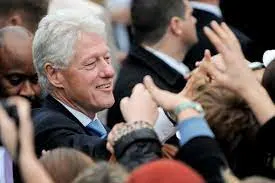“Pressing the flesh” refers to shaking hands, usually in a warm and effusive manner. It is an integral part of most political campaigns in normal times.
Mingling, kissing babies, and pressing the flesh are all ways for politicians to work a crowd and make personal contact with the electorate. It can also be called “working the room” and is a defining feature of retail politics.
By doing this, politicians demonstrate their comfort and ease with voters. In contrast, politicians who do not press the flesh risk being seen as aloof or stand-offish.
Politicians who know how to press the flesh come in for an extra degree of praise.
Bill Clinton was always seen as an effective mingler; Hillary Clinton, on the other hand, was often accused of being overly reserved. People wanting to praise Hillary Clinton often found themselves having to contradict the popular view of her.

Writing in the New York Times, Mark Leibovich said:
I had observed Clinton in many rope lines over the years, and I can attest that she’s effective in those settings, though not at the level of her flesh-pressing demon of a husband. I watched her during the Democratic primaries in 2008 as she greeted a crowd of voters in Charleston, W.Va.
One woman described to Clinton a litany of her life’s struggles in the space of a few seconds (her husband’s diabetes, their lack of health insurance); the candidate nodded through squinted eyes, signed an autograph on a napkin and hugged the woman, who walked away in tears.
Donald Trump had his own pressing the flesh issues to deal with.
Long before he became president, Trump was notorious as a germophobe who hated to shake people’s hands.
Back in 2011, New York Magazine said:
In case you weren’t aware, Trump hates shaking hands. In his 1997 book The Art of the Comeback, he wrote, “One of the curses of American society is the simple act of shaking hands, and the more successful and famous one becomes the worse this terrible custom seems to get. I happen to be a clean hands freak. I feel much better after I thoroughly wash my hands, which I do as much as possible.”
On a number of occasions, he later referred to handshaking as “barbaric.”
In 2020, the COVID-19 outbreak made flesh-pressing a thing of the past; it was replaced by social distancing, zoom events, and masked gathering.
But even before 2020, many people had concerns about the way handshaking could spread germs.
Writing in 2006, Mark Leibovich said:
‘Campaigns are filthy. Not only in terms of last-minute smears and dirty tricks. But also as in germs, parasites and all the bacterial unpleasantness that is spread around through so much glad-handing and flesh-pressing.”
But in 2006, it was also considered ill-mannerly to wash or sanitize one’s hands after pressing the flesh.
Using disinfectant after shaking someone’s hands was often perceived as an insult, as if you were implying that the other person was dirty or diseased.
Leibovich noted that Bill Richardson, then-governor of New Mexico, made a point of never using hand sanitizer.
Said Richardson: “The great part about politics is that you’re touching humanity. You’re going to collect bacteria just by existing.”
Use of “Pressing the Flesh” in a sentence
- The politician was known for his ability to press the flesh, as he was always willing to shake hands and talk with voters on the campaign trail.
- Pressing the flesh is an important part of political campaigning, as it allows politicians to connect with voters on a personal level.
- Some politicians are more skilled at pressing the flesh than others, and are able to use this ability to build support and win elections.